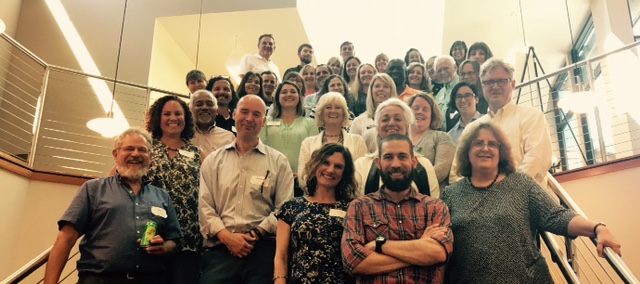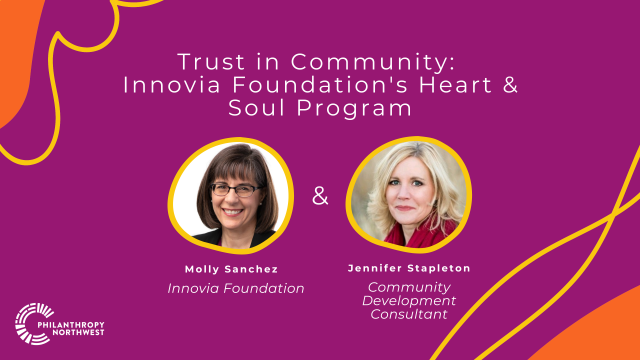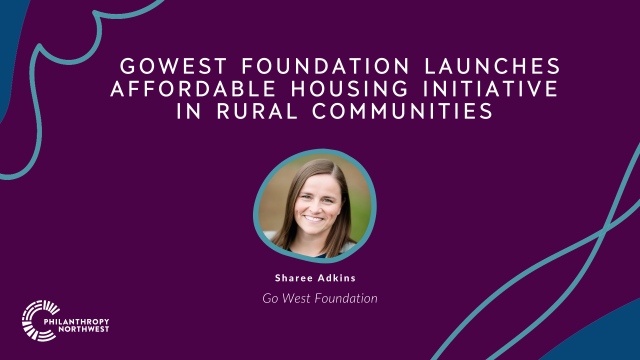Philanthropy Northwest convened a national gathering of 40 rural funders in late June in Roseburg, Oregon at the the Ford Family Foundation’s beautiful conference center. The goal of the gathering was to connect and explore the practice of grantmaking in rural communities and provide attendees an opportunity to connect with and learn from one another.
Rural America encompasses nearly 75% of the land area of the nation, but only 16% of the population, the lowest in history. That said, Philanthropy Northwest believes that rural America "punches above its weight" in terms of contributing to the health of our country and is poised to reap the benefits of coming economic and societal changes.
“As a planning committee member, it was important to Sherwood Trust to support our hosts at the Ford Family Foundation in welcoming other rural funders from across the region to the Pacific Northwest to learn together and discuss ways we can be more effective partners and advocates for rural communities,” said Danielle Garbe, the CEO of Sherwood Trust. “Philanthropy Northwest was critical to the success of this gathering given its expertise in strengthening the practice of philanthropy and ability to connect our region to other funders across the country who share the goal of supporting rural communities.”
Rural communities in the Pacific Northwest aren’t always known for their diversity, but several attendees expressed their appreciation of the racial and cultural makeup of the group.
"Our Native Hawaiian homestead communities are rural in a unique way, so I was worried that our perspective wouldn't be heard or truly appreciated, but I was pleasantly surprised,” said Michelle Kauhane, President and CEO of the Council for Native Hawaiian Advancement. “My experience in Roseburg was incredible. The opportunity to network, better understand rural issues from across the country and contemplate how our rural homestead issues might benefit from innovative work being done in other parts of the country was inspiring.”
Dr. David Rainey, a former Arkansas legislator and chairman of the Winthrop Rockefeller Foundation, echoed that sentiment: “It’s a really terrific thing to go to something like this and come away feeling powerful. That’s the impact that it had on me. And if I’m able to communicate that power to folks whose circumstances are different and give them a sense of I can get this done if I’m willing to work with other people to make it happen. That’s power.”
Dr. Rainey said he was amazed at how the Giving Practice exercises and framing questions effectively brought together a group of people from diverse backgrounds into focus around a common purpose. In the current political landscape, with power and populations not favoring rural communities, that’s more important than ever, he said.
“The challenge is that because we don’t have the political clout in rural areas, we need more assistance through nonprofits and rural funders that can actually build our capacity,” he said. “That requires we band together and work together to share resources.”
Dr. Rainey said that many people in rural communities have pressing immediate needs, like a roof over their head, but the longer-term focus is just as important: building capacity to help rural communities become self-sustaining.
As the federal co-chair of the Denali Commission, which is tasked with delivering federal government services in the most cost-effective manner in rural Alaska, Joel Neimeyer sees those immediate challenges firsthand every day. The commission provides job training services in rural areas, as well as assisting communities with power generations, modern communications, water, sewer and other rural infrastructure needs. Most recently, its authority has expanded to include health care facilities and the ability to accept private gifts or donations to carry out its mission.
Neimeyer said he came to the gathering with a clear agenda item: President Trump’s executive order on rural prosperity. The administration is currently seeking public comment on it, and Neimeyer said he hopes the attendees will take advantage of that opportunity.
He said that while Washington, D.C. may have a ways to go, he believes urban funders are “beginning to get it” that a successful investment involves really understanding community.
“Place-based philanthropy is really important for urban folks to understand,” he said. “It was really affirming to hear that from everyone I spoke to in one way or another.”

Joining Philanthropy Northwest as sponsors were the host foundation, the Ford Family Foundation, and the following:
- The Neil and Louise Tillotson Fund of The New Hampshire Charitable Foundation (NH)
- Shelk Foundation (OR)
- Winthrop Rockefeller Foundation (AR)
- Sherwood Trust (WA)
The gathering’s design planning committee included leaders from the following organizations:
- Montana Community Foundation (MT)
- Sherwood Trust (WA)
- Nebraska Community Foundation (NE)
- Telluride Community Foundation (CO)
- Ford Family Foundation (OR)
- Orton Family Foundation (VT)
- Winthrop Rockefeller Foundation (AR)


